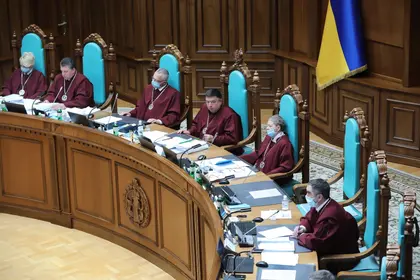The Constitutional Court has effectively destroyed Ukraine’s asset declaration system for officials by depriving the National Agency for Preventing Corruption (NAPC) of most of its powers, according to a ruling published by the court on Oct. 28.
The court ruled that these powers were unconstitutional and also canceled penalties for lying in officials’ asset declarations. The NAPC is tasked with monitoring asset declarations and initiating penalties for violations in them.
- Read the most contemporary war in ukraine update in the Kyiv Post’s daily news pieces for today.
- Obtain the most current Ukraine news articles released today.
JOIN US ON TELEGRAM
Follow our coverage of the war on the @Kyivpost_official.
“The declaration system has been destroyed completely,” Halia Chyzhyk, a judicial expert at the Anti-Corruption Action Center, told the Kyiv Post.
This court’s assault on anti-corruption institutions may disrupt lending from the International Monetary Fund and lead to suspension of visa-free travel with the European Union.
Several judges of the Constitutional Court are themselves under investigation by the NAPC over failing to fully declare assets in their declarations.
The Constitutional Court did not respond to a request for comment.
“Corrupt practices are triumphing at the highest level: judges of the Constitutional Court made the decision in the illicit enrichment case in their own interests,” the NAPC said in a statement.
The NAPC said that Constitutional Court judges Iryna Zavhorodnya and Serhiy Holovaty had a conflict of interest but voted for the decision, which is banned by the law in case of a conflict of interest.
The agency said it had identified incorrect information on assets worth Hr 3.6 million in Holovaty’s asset declaration and incorrect information on assets worth Hr 1.4 million in Zavhorodnya’s declarations. The NABU has opened a criminal case against Zavhorodnya.
The NAPC also said that Constitutional Court judges Ihor Slidenko and Volodymyr Moisyk had failed to declare changes in their assets on time, which is a misdemeanor.
President Volodymyr Zelensky’s representative Fedir Venislavsky on Oct. 8 asked for the recusal of four Constitutional Court judges in this case. The judges have an explicit conflict of interest, according to the NAPC.
The Constitutional Court refused to recuse its judges Slidenko, Moisyk and Zavhorodnya and postponed a decision on the recusal of Oleksandr Tupitsky, head of the court.
“The NAPC is convinced that a decision on such a sensitive issue must be made in a way that will deprive (Ukrainian) citizens of the least doubts about Constitutional Court judges’ compliance with the principles of objectivity and lack of bias,” the anti-corruption agency said on Oct. 8.
The President’s Office also made a statement on the Constitutional Court decision.
“Unfortunately in Ukraine there are still corrupt politicians who cannot tolerate the fact that their lifestyle, property and income can be under control,” the President’s Office said. “But, despite the sabotage, relevant tools in Ukrainian legislation will be kept or at least reinstated.”
However, even if the anti-corruption laws canceled by the Constitutional Court are reinstated, officials who committed crimes before the reinstatement will escape punishment.
The Constitutional Court has recently dealt other major blows to Ukraine’s anti-corruption institutions.
On Aug. 28, the Constitutional Court ruled that then-President Petro Poroshenko’s 2015 decree to appoint Artem Sytnyk as head of the National Anti-Corruption Bureau of Ukraine (NABU) was unconstitutional. On Sept. 16, the Constitutional Court also ruled that some clauses of the law on the NABU were unconstitutional.
The rulings did not explicitly say that Sytnyk was no longer head of the NABU.
However, there have been fears that Zelensky’s majority in the Verkhovna Rada would change the law in order to fire Sytnyk and appoint a Zelensky loyalist who would block cases against top incumbent officials. On Oct. 26, the odious Kyiv District Administrative Court used the Constitutional Court rulings as a pretext to order Sytnyk’s dismissal.
The Constitutional Court helped corrupt officials by canceling the previous law criminalizing illicit enrichment in 2019. The Rada had to pass a new law on penalties for illicit enrichment later last year.
The Constitutional Court also partially canceled the judicial reforms of both ex-President Petro Poroshenko and Zelensky in February and March 2020 and entrenched judicial impunity by canceling the law criminalizing unlawful court rulings in June 2020.
Legal experts and anti-corruption activists have long called for the current Constitutional Court to be replaced. They say it has lost its credibility and is simply too controversial.
Matti Maasikas, the EU’s ambassador to Ukraine, and Kristina Kvien, the acting U.S. ambassador to Ukraine, met Oleksandr Tupitsky, head of the Constitutional Court, on Oct. 27. He has also met other G7 ambassadors.
The Kyiv Post’s sources said Tupitsky was trying to persuade them that the court is not going to destroy anti-corruption institutions.
Editor’s Note: This is a developing story. It is being updated.
You can also highlight the text and press Ctrl + Enter




